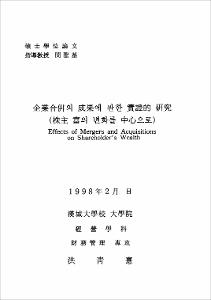企業倂合의 成果에 관한 實證的 硏究
= Effects of mergers and acquisitions on shareholder's wealth
- Type
- Thesis
- Alternative Title
- 株主 富의 변화를 中心으로
- Department
- 經營學科財務管理專攻
- Issued Date
- 1998
- Publisher
- 漢城大學校 大學院
- Files in This Item:
-
-
Download
 000000066381.pdf
기타 데이터 / 4.05 MB / Adobe PDF
000000066381.pdf
기타 데이터 / 4.05 MB / Adobe PDF
-
Items in Repository are protected by copyright, with all rights reserved, unless otherwise indicated.